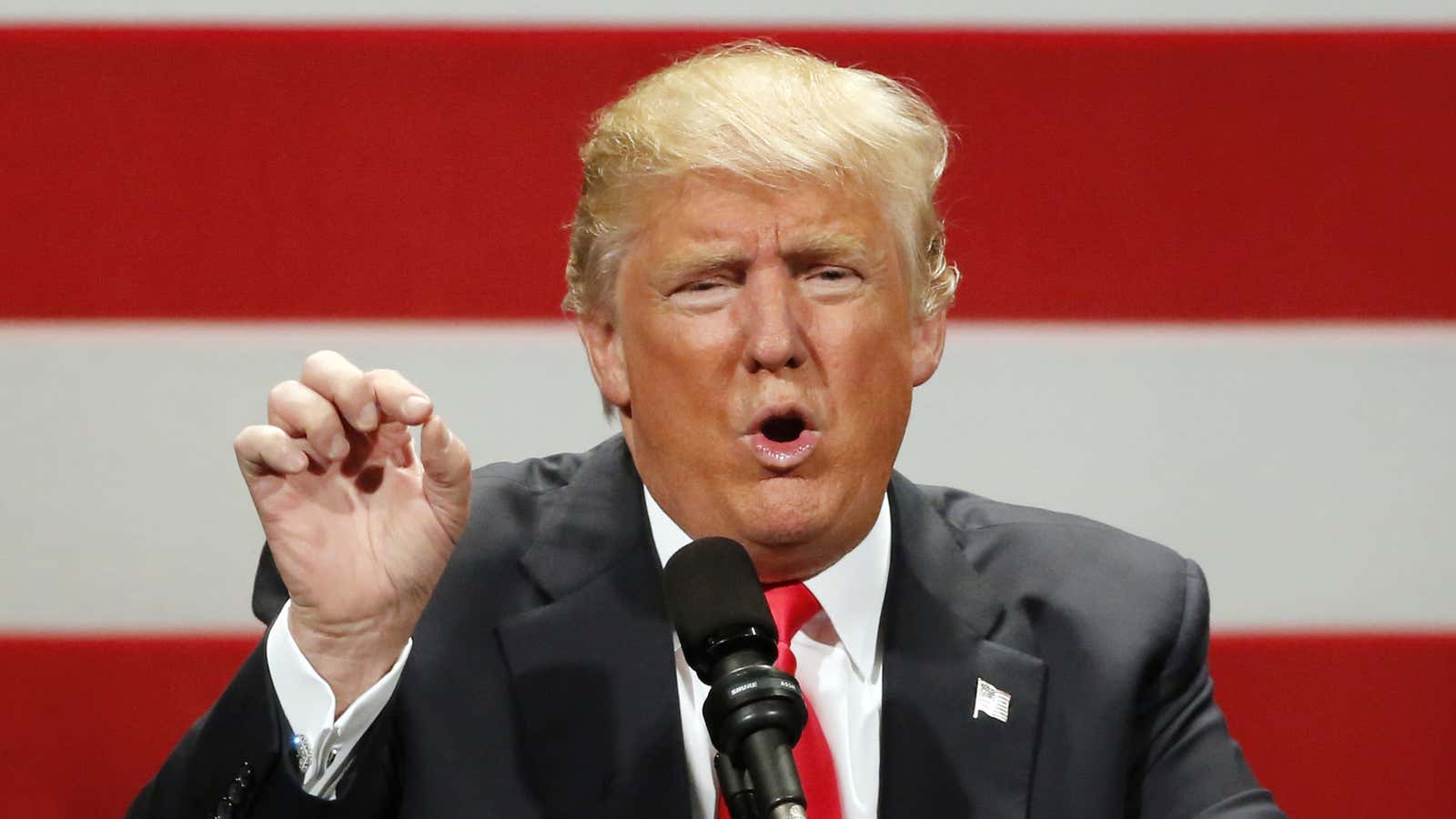Whatever else may come of Donald Trump’s campaign for US presidency, one thing seems certain: He’s produced some of foulest-mouthed speeches ever offered from a political podium. A recent anti-Trump ad by a conservative political action committee compiled clips of the candidate saying the unsayable in very public forums. Trump’s on-camera lexicon includes damn, sonofabitch, fatass, bullshit, bumsucking, pussy, knock or beat the shit out of someone, fucking, go fuck yourself–and even what is generally seen as the ultimate curse word, motherfucker.
Journalists and politicians alike have accused Trump of cheapening and demeaning public discourse. For his part, Trump claims such squeamishness is yet another example of the mealy-mouthed elitism that plagues the US. “It’s stuff like this that people in this country are tired of today,” he told a reporter who inquired about his vulgar language in March.
But while breaking linguistic taboos can indeed be a means of challenging the stuffy status quo, a closer look at Trump’s use of foul language makes it clear that he has other motivations. Paradoxical though it may appear, his use of vulgar language is about winning friends and influencing people—while strategically alienating others.
First, let it be remembered that politicians have never been polite. Consider the famous 1920s spat between Winston Churchill and his fellow politician Bessie Braddock. “Winston, you’re drunk,” Braddock said. Churchill shot back, “Well, madam, you are ugly, but I’ll be sober in the morning.” One can imagine the social media storm that would have followed that today.
Then there was senator William E. Jenner on then-New York governor W. Averell Harriman: “He’s thin, boys. He’s thin as piss on a hot rock.” In the 19th century, Texas senator and governor Sam Houston claimed that his fellow politician Thomas Jefferson Green “has all the characteristics of a dog except loyalty.” Former US president Harry S. Truman called Richard Nixon, running for the job in 1960, “a no good lying bastard.” Truman added that anyone foolish enough to vote for Nixon should “go to hell.”
Yet while politicians have long vituperatively damned their rivals, they typically stay within the realm of socially acceptable speech. Trump does not—hence the outcry.
The moral case against much of Trump’s swearing appears dubious, given that the last few decades have seen a shift in the stigma surrounding so-called “dirty words.” As societal taboos shift, so do the curse words we find offensive. As Matthew J.X. Malady writes in Slate, the word “bastard,” yet another of Trump’s insults, was once a hot-button slur questioning the legitimacy of one’s parentage. Now that we’ve become more adjusted to the idea of having children out of wedlock, “bastard” is now seen as a relatively mild insult. And frequent swearing in action movies and cable television has further inured many people to vulgarity.
That doesn’t mean vulgar language fails to register: It still remains outside much of the public discourse, and many deem it offensive even in private. But for many, the real obscenities lie elsewhere, in the taboo terms that arise from racism, sexism, and homophobia. The N-word is unacceptable in any context. The occasional F-bomb is nothing in comparison.
If Trump is indeed lowering the standards of our public discourse, his audiences don’t seem worried. Like the class clown buoyed by his less audacious friends, Trump plays cheekily to the crowd. Every breach of taboo brings a roar of approval.
But it’s here that the more troubling implications Trump’s use of vulgarity become clear. On the surface, it’s easy to see how supporters might view his use of foul language as a refreshing contrast to the jargon, double-talk and downright untruths that we’ve come to expect from politicians. Trump, self-appointed man of the people, is trying through his unrestrained manner of speech to position himself of “us” not “them.”
Yet Trump’s “daring” use of curse words is closely linked to his willingness to compare Mexican immigrants to rapists, or to suggest that women who have abortions ought to be punished. His supporters say that they’re sick of political correctness. They don’t want to be lectured about microaggressions and xenophobia; they’re eager to be liberated from what they see as linguistic censorship. So in tossing around forbidden syllables to the enthusiastic approval of his backers, Trump implicitly endorses the idea that hateful speech belongs in the same category as everyday vulgarity. “Plain folks” aren’t afraid to curse—or to root for barring Muslims from entering the country.
This is also a way for Trump—much like former US vice president Dick Cheney—to flex his muscles and emphasize his alpha-male status. In the UK, men challenging opponents to a fight tell them, “Come on then if you’re hard enough!” Trump has consistently used vulgarity to promote his supposed masculinity, right down to calling senator Ted Cruz a “pussy” and reassuring Americans in a Republican presidential debate that he was well-endowed. This attitude is all of a piece with his wide-spectrum attacks on other countries that seem to compose his foreign policy positions.
Ultimately, the problem with Trump’s use of vulgarity is not so much obscene language itself as the ways in which he has chosen to deploy it. Yet there may yet be hope for turning vulgar language against Trump. Some say that our surnames guide our fates. The name “trump” has a long history in UK slang. It means “breaking wind.”




